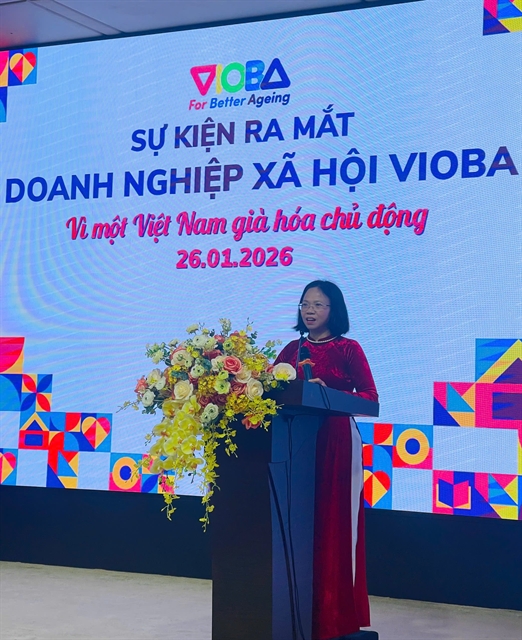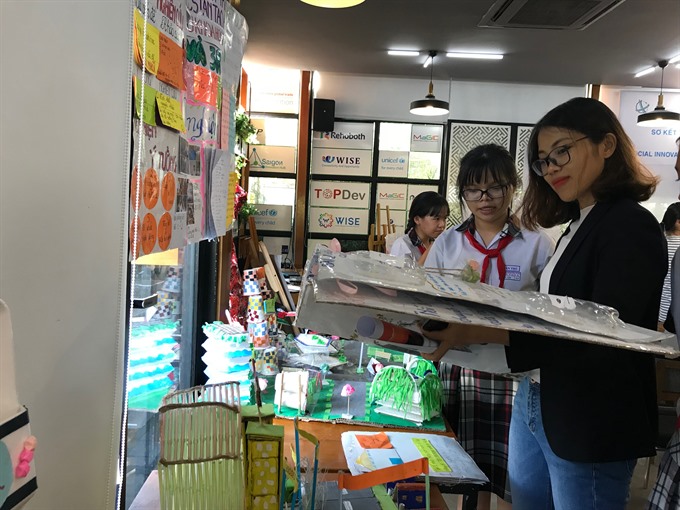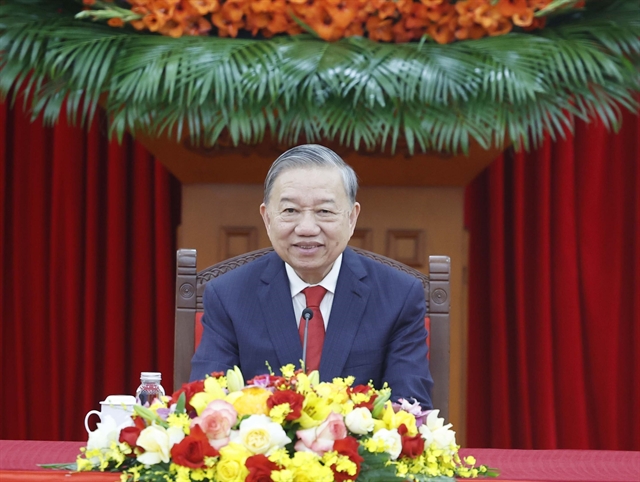 Society
Society

Students at secondary schools in HCM City are encouraging their peers and adults to classify garbage before it is recycled.
 |
| A student at Tân Tạo A Secondary School in HCM City’s Bình Tân District shows products made from recycled waste at the Sài Gòn Innovation Hub. – VNS Photo Gia Lộc |
Gia Lộc
HCM CITY — Students at secondary schools in HCM City are encouraging their peers and adults to classify garbage before it is recycled.
Nguyễn Văn Thành Thông, 14, of District 7, and his friends, for example, worked with members of the Tân Quy Ward’s Hồ Chí Minh Communist Youth Union to convince residents living on Vườn Điều alley to classify garbage at the source and place it in dustbins.
“Local residents were not putting trash in garbage cans even though they were right in front of their houses,” Thông said.
Because official garbage collectors could not push their cars in the narrow alley, rubbish from several households was never collected.
To resolve the problem Thông and his friends decided to meet with members of Tân Quy Ward’s Hồ Chí Minh Communist Youth Union. After residents agreed to their solution, the ward authorities developed regulations for classifying and throwing away rubbish on the alley.
Thông and others also visit some households in the ward each month to pick up their garbage and take it to the ward’s recycling facility where it will be stored to sell to scrap collectors.
The money collected is used to buy food and other items for the elderly who live alone, he said.
The three R’s
At Tân Tạo A Secondary School in Bình Tân District, students Vũ Hoàng Sơn, Lê Thị Mai Trâm and Nguyễn Duy Tân are carrying out activities to improve student awareness about reducing, reusing and recycling waste.
Last November, the students, speaking at a workshop on social innovation programmes held by the United Nations Children’s Fund (UNICEF) and Sài Gòn Innovation Hub, said they wanted to curb littering by students on their campus.
The three students met the school’s managers and teachers to ask for permission to carry out a contest and other programmes to encourage classifying and recycling waste, which was held from August 29 to September 4 last year. The contest attracted many students who exhibited their product ideas in October.
The three students also gave a talk about environmental protection to all of the school’s students. As many as 300 students signed a commitment to stop littering.
“This helped reduce the amount of litter,” Sơn added.
At Huỳnh Văn Nghệ Secondary School in Gò Vấp District, students reused waste, including the soles of rubber sandals, cartons and galvanised pails to make musical instruments such as guitars and drums, which are now used by students.
The students’ idea won a consolation prize in a contest this year called Community Ideas, which aimed to encourage individuals and organisations to come up with innovative ideas, products and solutions that would promote socio-economic development.
At many other schools in the city, students are increasingly becoming more environmentally conscious.
At many schools, three dustbins that sort rubbish according to eventual use have been set up on campus.
At 30 kindergartens in the city, children have been taught to push straws back into empty cartons after drinking and flatten, fold and dispose of the cartons properly to save space to sort and recycle more easily.
The effort was part of the pilot milk carton recycling programme called “Một giây hành động, bảo vệ môi trường” (one second of action to protect the environment).
“Educating children about environmental protection will help when they become adults,” said Phạm Thị Kim Hạnh, vice principal of a kindergarten which took part in the programme.
The programme was organised by the Department of Environment and Natural Resources’ Youth Union and Tetra Pak, the Swedish-owned global supplier of packaging products.
The kindergarten’s teachers worked with children’s parents to teach them recycling skills. The cartons collected at the kindergarten are transported once a week to recycling factories to make paperboard boxes, notebooks, tiles and dustbins.
After the pilot phase, the programme will be extended to more schools in the city as well as other localities across the country.
According to a report from the Ministry of Natural Resources and Environment, between 2011 and 2015, around 1.2kg of waste per capita was discharged daily in the country.
In Hà Nội and HCM City, households generate 8,900 tonnes and 6,739 tonnes of solid waste per day, respectively. — VNS





 Brandinfo
Brandinfo